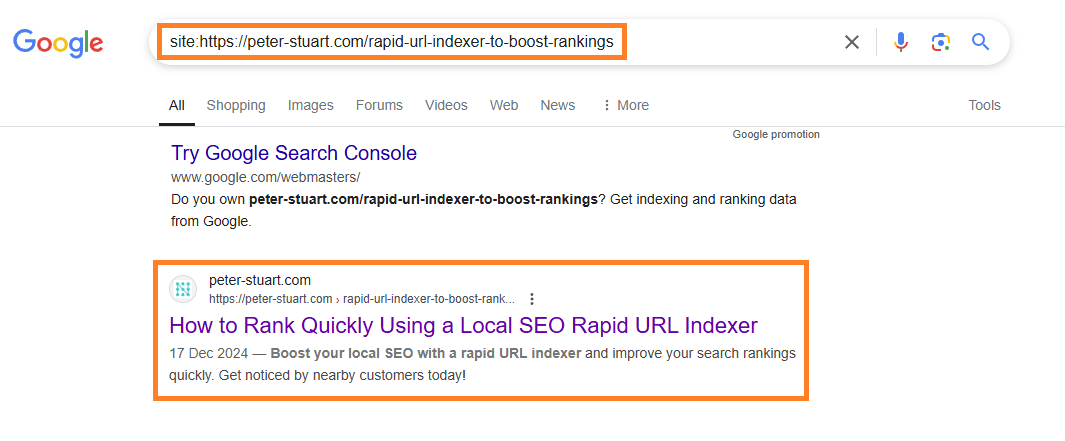How to Rank Quickly Using a Local SEO Rapid URL Indexer
If you’re looking to improve your local SEO efforts, a rapid URL indexer can be a game changer.
By making sure that your website is optimized for local searches and utilizing a reliable indexer, you can submit your URLs directly to search engines which can speed up the indexing process.
This not only boosts your visibility but also encourages search engines to crawl your site more frequently, a key part of any successful Fixed Price SEO plan
But, the real question is: what steps do you need to take to set this up properly to maximize your results?
By the end of this article you will know exactly what to do step by step to get indexed quickly.
Lets get started.
Foundational Local SEO
When it comes to boosting your online presence, understanding local SEO is key. Local SEO focuses on optimizing your online visibility for local searches.
It’s all about making sure your business appears in search results when potential customers look for services or products in your area.
There are a few things you should do to create a strong foundation for your indexing efforts.
To begin with, you should claim and optimize your Google My Business listing. Confirm accurate information like your business hours, address, and contact details.
You’ll also want to gather customer reviews. Positive reviews not only build trust but also influence local rankings.
Another thing to spend some time on is placing local keywords throughout your website. Integrate these keywords in your content, meta descriptions, and title tags.
Consistency in citations is also extremely important for local SEO as it helps search engines understand the relevance of your business to local queries.
Now that you have set the stage, lets take a look at the importance of quick indexing.
What Is a URL Indexer?

A URL indexer is a tool designed to help search engines quickly discover and catalog your web pages. When you create new content, it’s important for search engines to find it quickly.
Without an indexer, your pages might take longer to appear in search results which could mean your missing out on valuable traffic.
URL indexers work by submitting your URLs directly to search engines. This send them a signal about new content or updates on your site.
Essentially, the indexer acts as a bridge between your web pages and the search engines.
Using a rapid URL indexer can supercharge your local SEO efforts allowing your business to connect more effectively with local audiences.
Benefits of Rapid URL Indexing
By getting your URLs indexed faster, you gain a serious advantage in SEO and traffic.
Here’s why rapid URL indexing matters:
✅ Speeds up visibility – Your pages appear in search results faster, increasing traffic.
✅ Boosts local rankings – Search engines prioritize fresh, well-indexed content.
✅ Improves Google Business Profile performance – Quick updates mean your business stays relevant in Google Maps and local packs.
✅ Gives multi-location businesses an edge – Ensuring all location-based pages are indexed fast improves visibility across multiple regions.
Setting Up Your URL Indexer
Start by selecting a reliable URL indexer that aligns with your local SEO goals.
You’ll next need to gather the URLs you want to index. It’s important to compile a list of relevant (Not indexed yet) pages from your website. These could be the URLs of blog posts you have already created and published for example.
Organizing your URLs in a spreadsheet can help streamline the process.
After gathering your URLs, log into your indexer account and navigate to the submission feature. Here, you can input your URLs in bulk or one at a time depending on what tools you are using
Monitoring Indexing Progress
Once you’ve submitted your URLs for indexing, monitoring URL performance becomes essential for understanding how search engines are interacting with your content,
You can inspect the URL in Google Search Console to verify the URL has been indexed.
Another manual way of doing this is to place the prefix “site:” before the URL to see if it appears in the search results
For example: site:www.your-domain.com/pagexyc
Here are some other key aspects to monitor:
- Index Status: Regularly check if your pages are indexed and if there are any errors reported by the search engine.
- Crawl Frequency: Notice how often search engines visit your site, as this can indicate how much importance they assign to your content.
- Traffic Analytics: Use analytics tools to track any changes in traffic once your URLs are indexed, which can give insights into your SEO strategy’s effectiveness.
Also, by becoming familiar with local SEO metrics, you refine your approach based on geographical performance.
More Tips for Faster Local Page Indexing
While a rapid URL indexer is a powerful tool for getting your pages indexed quickly, there are additional steps you can take to speed up the process even further.
By combining these best practices with rapid indexing, you can maximize your local SEO impact and improve your search rankings.
To do this, try the following strategies:
1️⃣ Update Your Google Business Profile – Keeping your GBP updated with the latest service pages and offers helps strengthen your local SEO efforts.
2️⃣ Optimize for Local Keywords – Ensure your page includes relevant local search terms like “best plumber in [city]” to improve search relevance.
3️⃣ Submit Your URL Manually – Use Google Search Console to submit your page for indexing instead of waiting for Google to crawl it naturally.
4️⃣ Strengthen Internal Links – Link new pages to existing high-traffic pages to help search engines discover them faster.
By combining rapid URL indexing with smart local SEO strategies, you can boost visibility, attract more customers, and stay ahead of the competition. Start optimizing today and watch your local presence grow!
Measuring Overall SEO Success

Measuring your overall SEO success is important if you want to understand the impact of your efforts and make informed decisions moving forward.
To evaluate your SEO performance, focus on key metrics.
Organic traffic. Indicates how many visitors arrive at your site through search engines. A consistent increase in organic traffic often signals effective SEO strategies.
Keyword rankings. Track how well your target keywords perform over time. If you notice upward movement, it suggests your content is resonating with search engines.
Click-through rate (CTR) of your pages. A higher CTR indicates that your title tags and meta descriptions are compelling enough to attract clicks.
Monitor user engagement metrics, such as bounce rate and average session duration. Lower bounce rates and longer sessions often reflect a better user experience which search engines favor.
Conclusion
Leveraging a local SEO rapid URL indexer can massively improve your online visibility and boost your search engine rankings.
By making sure that your website is well-optimized and submitting URLs properly you can capture more local traffic.
Regularly monitoring your indexing progress and adhering to best practices for local SEO will further fortify your efforts.
By implementing these strategies you’ll position your business for success in the competitive local market.
Contact us today to learn how we can help you implement a rapid URL indexer strategy tailored to your business and accelerate your local SEO efforts!
Ready to boost your local business visibility? Start using rapid URL indexing now, and stay ahead of your competitors!


